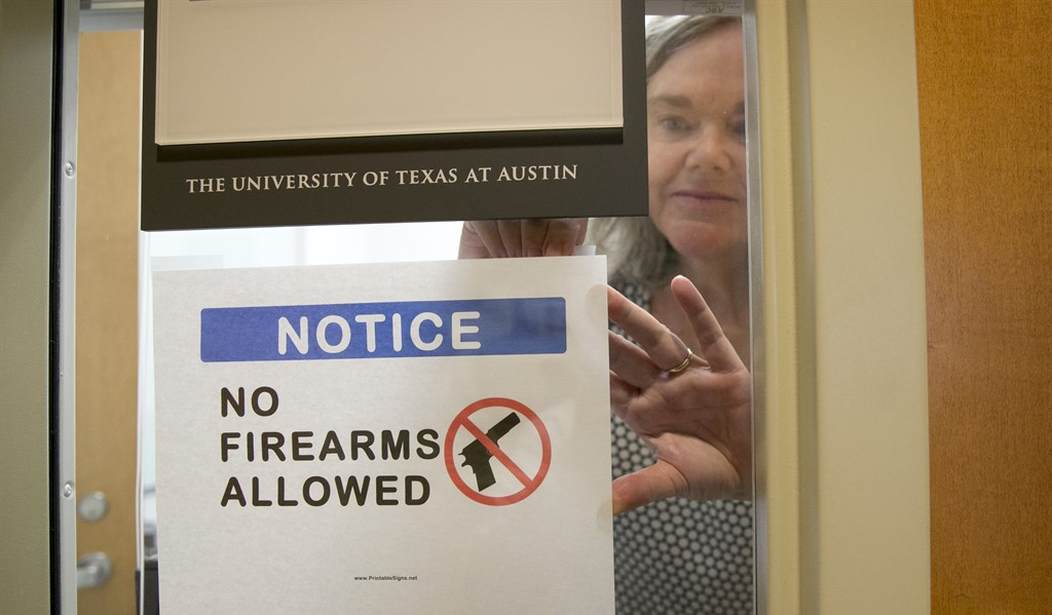The West Virginia state Senate has already given the thumbs up to a bill allowing licensed concealed carry holders to lawfully bear arms on the campuses of the state’s public colleges and universities, and the House is set to vote on the measure early next week. On Friday, SB 10 received its first reading in the House, and a final vote could come as early as next Tuesday.
While support for the measure appears to be strong in the legislature, some students and faculty in the state are continuing to lobby against the bill, claiming that it would make colleges more dangerous places and lead to all kinds of unintended consequences. Unfortunately for the anti-civil rights side, their arguments don’t stand up to even the slightest scrutiny.
WVU sophomore Nicolas Raffinengo, for instance, believes that fewer students will choose to attend the university if campus carry is allowed.
The Register Herald reported last week that “the cost for implementation would be $11.6 million in its first year alone.” This cost increase coupled with the fact that other states that implemented campus carry saw a noticeable decrease in enrollment, with Colorado seeing a 5.8% decrease after campus carry, according to PolitiFact, means that West Virginia higher education will have to adapt with higher tuitions or cutting costs, both of which are negative effects to the students and faculty at these institutions.
Raffinengo didn’t provide a link to the Politifact report he cited, but I managed to find it online, and as it turns out it doesn’t help Raffinengo’s case at all.
Four of the nine states we looked at saw fairly consistent enrollment declines after a campus carry law took effect, while two showed no consistent pattern and three saw enrollment increases.
…
But even in the cases of the states with modest declines, it’s not clear that gun laws were the driving force.
Many other factors — such as the size of a state’s college-age population, whether universities are expanding or contracting their offerings, and broader economic forces — can affect enrollment numbers. For instance, improving economic conditions after the Great Recession may have led some students to take jobs rather than enroll in college.
David Bills, a University of Iowa sociologist who studies education, said it’s not impossible that there could be some relationship between campus carry and enrollment declines, but he said he’s never seen research on this question.
“Establishing a causal relationship between a particular law and enrollment trends would demand a very rigorous research design,” Bills said. “The standard of evidence would have to be pretty high. … If that research exists now, I’m not aware of it.”
I doubt Raffinengo is aware of any either, since it doesn’t appear that any such research has actually been done.
Marshall University history professor and Marine Corps veteran Chris White, on the other hand, seems to think that the average student (or staff member) on campus just isn’t responsible enough to exercise their Second Amendment rights.
SB 10 has minimal institutional safeguards in place. All that is required is that the adult has a Concealed Handgun License (CHL), which requires a written test, a background check and a short live fire course.
The military and police have infinitely more training than the average concealed carriers, and their training is fine-tuned with constant re-qualifications, feedback from experts, as well as medical, physical and mental tests. This ensures they can be counted on to use these weapons in an adrenaline-filled, chaotic firefight under the orders of superiors.
The only safeguards in SB 10 would not qualify as such in the military or law enforcement. If a student, they would have to have a CHL and would have to store their weapon in a locker.
The military has armories, guards and armorers, which keep these weapons maintained and prevent theft and tampering.
Who is going to force armed students to comply with keeping their weapons maintained, unloaded, on safe and in a locker? What is going to prevent students’ weapons from being used by non-CHL holders — friends of the holder, thieves, etc. — who might handle these weapons?
Accidental discharges happen most often with untrained people, and we’re going to introduce a whole lot of untrained people to these weapons with SB 10, just by allowing students with CHLs to bring the guns to the dorm lockers.
Sounds to me like White’s real objections are with the state’s concealed carry law in general, which makes me wonder why he continues to live and work in the state if he really believes the law is so terrible. After all, West Virginia also has a Constitutional Carry law in place, so legal gun owners don’t even need a CHL before they can bear arms in self-defense in most locations. Under SB 10, individuals would have to possess a valid CHL before they could lawfully carry on campus, but anytime White goes to the grocery store, gas station, or grabs a bite to eat the chances are good that he’s around at least one individual who’s currently armed.
As for how the provisions of the campus carry law would be enforced, I’d ask White who is currently “forcing” students to comply with living and attending class in a gun-free zone? It’s not like Marshall or WVU have metal detectors set up at every entrance to the campus or at individual buildings. Declaring these campuses to be firearms-free doesn’t stop anyone from unlawfully bringing a gun on campus with nefarious intent, but allowing students and faculty who are licensed to carry a concealed firearm the ability to do so legally may very well give a would-be victim the chance to fight back and protect their life.
At the end of the day SB 10 doesn’t change who can carry a firearm for self-defense. It just expands where responsible gun owners who’ve obtained a permission slip from the state can bear arms. A concealed carry holder doesn’t become a more dangerous person when she sets foot on a college campus, and West Virginia universities won’t become more dangerous places when campus carry is the law of the land.









Join the conversation as a VIP Member